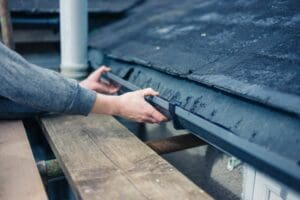During home inspections, seasonal changes can have a significant impact on the outcome, influencing various aspects of a property’s condition. As prospective buyers navigate the real estate market, understanding these seasonal variations can be crucial for making informed decisions. Here’s a breakdown of how different times of the year can affect key elements of a home inspection:
Winter Home Inspections
Roof Inspection Snow and ice accumulation can mask potential roof issues. A professional inspector will need to take extra precautions to assess the roof’s integrity, looking for signs of ice dams, snow loads, and any damage caused by freezing and thawing. Reminder: In cases of extreme weather conditions and roofing material, home inspections can be limited due to the inspectors comfortability in getting on the roof.
HVAC Systems: Winter is the time when heating systems are put to the test. Inspectors will focus on ensuring that furnaces, boilers, and other heating elements are functioning optimally. Frozen pipes are also a concern, so proper insulation and heat circulation are critical. Reminder: Some HVAC manufacturers recommend that some systems not be ran if temperatures are below a certain degree. Check with your manufacturer to ensure proper function of your system.
Foundation Concerns: The freeze-thaw cycle can impact the foundation. Inspectors will pay attention to cracks, shifts, and other signs of stress that may be more pronounced during colder months. Reminder: As the seasons change, so does your home. It is prone to contracting and expanding due to elements like temperature, moisture level, soil, and building material.
Spring
Roof and Gutters: Spring brings rain and the potential for roof leaks. Inspectors will check for any water damage, as well as the condition of gutters and downspouts to ensure proper drainage away from the foundation.  Reminder: Protecting your home from costly expenses can be relatively inexpensive and simple. Invest in splash blocks and down spout extenders to assist in the diversion of water away from your home.
Reminder: Protecting your home from costly expenses can be relatively inexpensive and simple. Invest in splash blocks and down spout extenders to assist in the diversion of water away from your home.
HVAC Systems: As the weather transitions, inspectors will evaluate air conditioning units. It’s essential to confirm that the cooling system is in good working order, especially after a period of inactivity during the winter. Reminder: With Spring, comes the pollen. Check, clean, and replace those air filters!
Foundation and Drainage: With thawing snow and increased rainfall, inspectors will assess how well the property drains excess water. Poor drainage can lead to foundation issues, so proper grading and functioning drainage systems are crucial. Reminder: Some water mitigation issues can be as simple as removing or adding dirt to divert the water from your foundation.
Summer
Roof and Attic Inspection: The intense heat of summer can exacerbate roof issues. Inspectors will look for signs of sun damage, worn shingles, and proper attic ventilation to prevent heat-related problems.
HVAC Systems: Summer is the time when air conditioning is heavily used. Reminder: Ensuring your windows and doors are properly sealed can mitigate the high use of your A/C. Check under your exterior doors where the bottom of the door meets the floor. Look for daylight as this is a key indicator of unwanted drafts entering and exiting the home.
Pest Inspection: Warmer months often bring pests. Inspectors will check for signs of infestation, especially in attics, basements, and crawl spaces.
Fall
Roof and Gutter Maintenance: Falling leaves can clog gutters and create potential water damage. Inspectors will ensure that gutters are clear and functioning correctly, and they’ll assess the roof for any damage that may have occurred during the summer. Reminder: Check for any trees with leaves ready to drop. As you clean the gutters through the fall, leaves will continue to make their way into your gutters. Once the trees become bare, it will be less likely that the leaves continue to accumulate in the gutters and on your roof.
HVAC Systems: As the weather cools, it’s time to shift focus back to heating systems. Inspectors will check for any issues that may arise when transitioning from cooling to heating.
Foundation Inspection: Before winter sets in, inspectors will conduct a thorough check of the foundation to identify any new cracks or shifts that may have developed during the changing seasons. Reminder: You can check/mark cracks to monitor as a homeowner. Standard chalk works well for concrete and masonry foundation materials like concrete blocking. Circle or mark an existing cracks to monitor any further movement. When in doubt call a professional to seek proper guidance.
Buyers should be aware of these seasonal considerations and work closely with their home inspector to address any specific concerns related to the time of year. Additionally, understanding how seasonal changes affect a property can help buyers anticipate future maintenance needs and make informed decisions about their potential investment.
If you have any questions or comments be sure to comment below or contact us via mobile or email!
(865)-393-3910
trevor@premierhomeinspectionllc.com
If you enjoyed this article please share with a friend!


.png)
